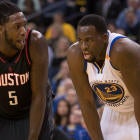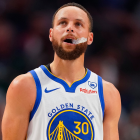Most of the basketball world celebrated on Wednesday night when the NBA and NBPA announced a tentative agreement on a new collective bargaining agreement, successfully avoiding a lockout next summer. Golden State Warriors forward Draymond Green, however, was not pleased with the deal. On Twitter, Green called it a "heartbreaker," adding, "Stand for something... or fall for anything," and, "One day we will get it right.... maybe."
At Thursday's shootaround before the Warriors' game against the New York Knicks, Green elaborated on his tweets for more than 10 minutes, per the San Jose Mercury News' Anthony Slater. His main grievance: the new agreement should have done more for the NBA's middle class.
Some quotes, all via the San JoseMercury News:
- "As a superstar in this league, you'll be taken care of. So it's not more so about us, it's more so about the guys who aren't on our level. When I look at my career, I didn't expect to be at this level I'm at now, so I kind of identify more with those guys that have not made it to this level that I've been fortunate enough to make it to. So when I think of contract negotiations and the CBA, I think of them. And how can we help them? How can we help the guys that aren't making as much make more?"
- "Everybody's doing pretty good. But at the same time, if you can help some guys do better, why not help 'em? That's my whole vision on it. That's my stand on it. That's where I'm at. No one can talk me out of that. No one can change my mind on that. Because without all 15 guys, yeah, you can be an All-Star, you can be a max player, but without these guys, you can't practice, you can't get a sub, you can't go through 82 games playing 48 minutes a game. If you get hurt, nobody's there to step in for you. Every guy matters. And I think every guy should be taken care of. In the grand scheme of things of, once again, because this, I think there's a fine line in between 'Draymond's complaining about someone who's making a great living' and really understanding how much money is actually involved in this. So my complaint is not one of everybody's not making a good living. It is, there is a good living in this for everybody; however, for some, it can be better. And how do we help elevate those guys that are more on the lower end of the totem pole? How do you elevate those guys?"
- "It's not even necessarily that it's a higher minimum salary. I think there could be a different structure to have not as many minimum players. Right now there's like a max and a minimum, a couple of in-betweens. I think there could be different structures to make the minimum guys make more and not be a 'minimum player.' But like I said, there's a lot of things that I'm still going over, that I can't really speak to every specific right now because I'm still reading through all these things because it's a lot. I want to be informed on everything that's going on, and I want to try to help guys who aren't an All-Star, who aren't a top-15 or top-20 player in the league. How do we help 100-to-200 top players in the league? And so that's more so my focus, my frustration that I expressed. Not, which everybody will probably say, 'oh, Draymond thinks he should make more money.' I am doing just fine."

Green's argument is fascinating, especially considering his ascension from role player to All-Star in the past few years. Everyone signing new contracts will benefit from the new CBA because minimum salaries will increase, as will rookie salaries and the mid-level and bi-annual exceptions. Green's point is that this agreement did nothing to close the gap between the mid-tier players and the franchise players, especially in light of the enormous deals that veteran stars will be signing.
The economics of the NBA have changed significantly over the past couple of decades, partially because of the influx of money but also because of changes to the CBA and the way front offices approach team-building. There was a time, not so long ago, that some fans' biggest fear was that their favorite team would overpay a non-star with a long-term contract for the mid-level exception or more. If the player didn't pan out, then that dead money on the cap sheet could prevent the general manager from acquiring a true star.
For some teams, the correct team-building strategy became simple: try to land multiple stars, and then fill in the gaps with players on minimum salaries. When most of the league thinks this way, that creates a significant divide, and Green would have liked that to be addressed.


















